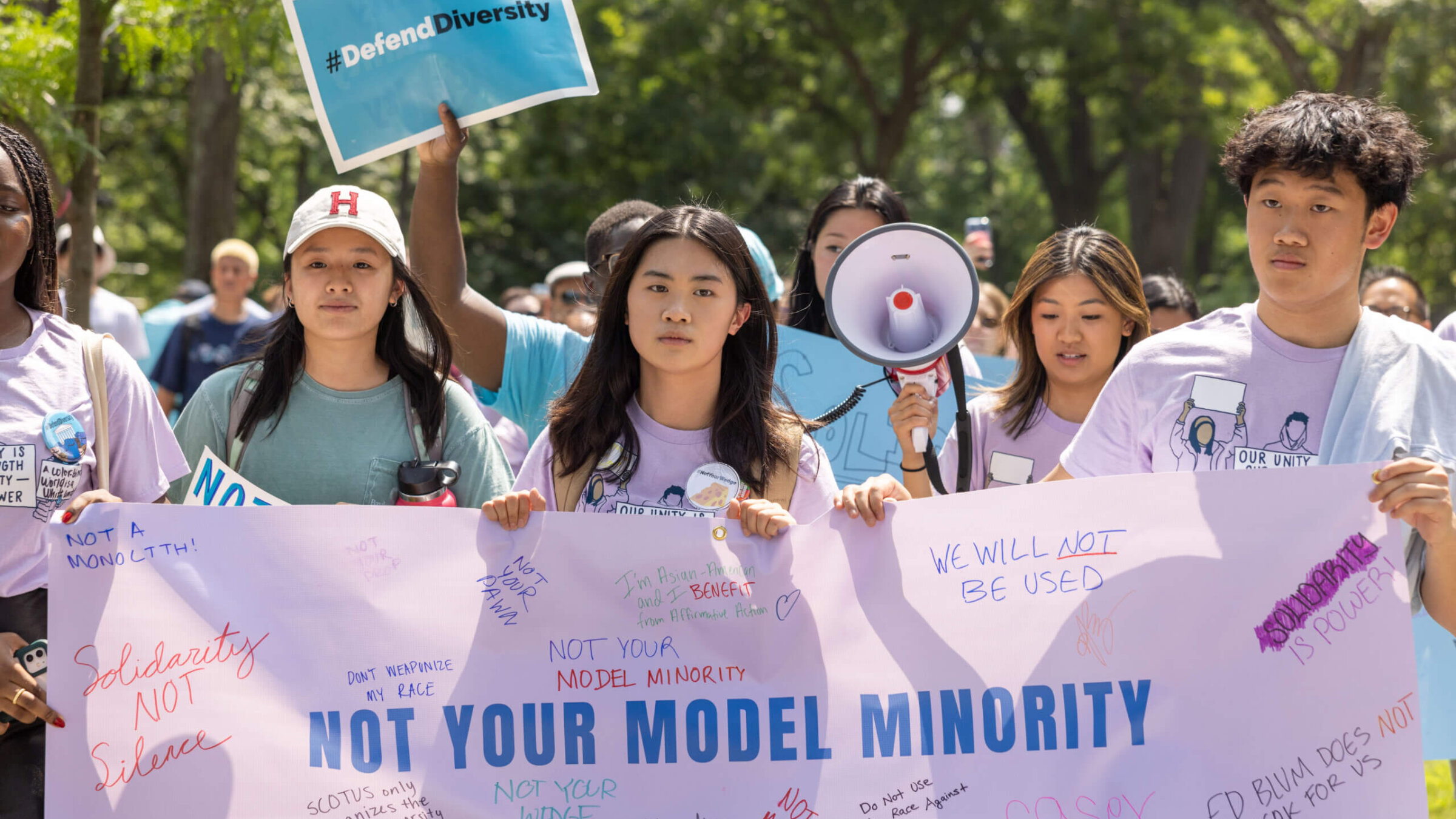Jewish identity was weaponized in Supreme Court case overturning affirmative action
The plaintiffs who successfully sued Harvard over affirmative action misrepresented the history of the institution’s Jewish quotas

Students and others march through Harvard University in support of affirmative action after the Supreme Court ruling on July 1, 2023 in Cambridge, Massachusetts. The Supreme Court’s landmark decision on Thursday to gut affirmative action has made it unlawful for colleges to take race into consideration as a specific factor in admissions. Photo by Scott Eisen/Getty Images
Like many college professors, I am worried about the decision in Students for Fair Admissions v. Harvard, one of two recent Supreme Court cases that effectively overturn affirmative action in college admissions. As a scholar who studies the history of Jews and race in America, I find the details of the case even more troubling.
In the case of SFFA, a group led by conservative Jewish activist Edward Blum, the very real history of antisemitism in the U.S. has been weaponized by conservative activists, becoming a bludgeon with which to destroy diversity on college campuses across the country.
Jewishness is not a mere footnote in the recent Supreme Court case. Blum — as well as the lawyers and academics who have helped SFFA to make their argument before the court — placed ideas about the history of Jewishness and race in the U.S. at the very center of their case against Harvard. The brief SFFA’s lawyers submitted to SCOTUS states that “Jewish students were the first victims of holistic admissions, and Asian Americans are the main victims today.”
The plaintiffs and those who filed briefs on their behalf distort both the history of racism in college admissions and antisemitism in the U.S. Both Jews and non-Jews need to be made aware of this aspect of the case, and its reverberations for how we think about race, identity and equality in the U.S.
In both written and oral arguments, the lawyers for Blum’s organization invoke Harvard’s early-20th-century Jewish quota system to support their argument against contemporary “holistic” admissions, which take race into account as one component of a student’s college application.
It is difficult to believe that this wildly disingenuous and ahistorical reading of Jewish history has held sway before the court. The quota system for Jews at Harvard was instituted in order to maintain homogeneity and the continued dominance of the white elites who had traditionally benefited from the old boys’ network of the university.
The affirmative action policies that Harvard has embraced over the last number of years have sought (with some success) to do the exact opposite: bringing race- and class-based diversity to the monochromatic landscape of the Ivy League. They have done so by considering race as one of the many elements of a student’s application.
It is true, as books like Jerome Karabel’s The Chosen: The Hidden History of Admission and Exclusion at Harvard, Yale, and Princeton document, that A. Lawrence Lowell, Harvard’s patrician president during the 1920s, was particularly worried over the unprecedented number of Jews winning acceptance to his august university. It is also true that his concerns led to the university introducing a quota system for Jews into the admissions process, with eugenics-inflected, euphemistic categories of “character and fitness,” in order to find a way out of their perceived “Jewish problem.”
However, it is false to argue, as The Louis D. Brandeis Center for Human Rights Under Law and the Silicon Valley Chinese Association Foundation do in the amicus brief they filed on behalf of SFFA, that “Harvard discriminates against Asian Americans in admissions in the same manner in which it discriminated against Jews in the 1920s and 1930s.”
During the 1920s and 1930s, a time of rising nativism and antisemitism in the U.S., Harvard feared that too many Jews might overwhelm the school’s wealthy, Protestant majority. “Character and fitness” were elusive terms given categories in order to deliberately exclude Jews from Harvard. The quota for Jews was not a stand-alone policy for Harvard’s president, but instead part and parcel of Lowell’s (and Harvard’s) wider embrace of eugenics.
The SFFA’s erroneous argument before the Supreme Court is that just as Harvard set arbitrary “character” categories in order to deliberately exclude Jews in the early 20th century, its current holistic admissions policies, that consider race as one of many categories, are explicitly designed to exclude Asian American students from admission.
The Asian American students whom SFFA recruited to sue Harvard did so not because the university espouses a policy that explicitly excludes them from admission due to their race or ethnicity, which they did for Jews in the 1920s and 1930s. In fact, Asian American students represent 30% of the 2023-2024 class, the highest percentage in Harvard’s history.
In contrast to the quota system of Lowell, holistic admissions are anti-eugenicist in nature. If they view race as a factor in admissions, it is not to exclude, but to include — to push back against the historical homogeneity of schools like Harvard. As a recent lawsuit makes clear, if any group has been privileged at Harvard, it is that of legacies, the grandchildren and great-grandchildren of Lowell and other white, wealthy denizens of the elite university who are admitted in staggering numbers each year.
If holistic admissions attempt to take into account more than simply grades and standardized test scores, it is because standardized tests, in particular, have been shown to carry inherent biases that disproportionately affect students of color. Socioeconomically-disadvantaged students, who cannot afford the test preparation courses that many applicants to Harvard take, are also negatively affected by an emphasis solely on their test results.
SFFA and its plaintiffs target Black and Latinx students, some of whom are admitted to Harvard with lower grades or test scores that white or Asian applicants, and hide behind Jews’ real experience of race-based exclusion during the early years of the 20th century by suggesting that any acknowledgment of the impact of race in admissions is equal to racism.
During a time when real anti-Asian and antisemitic violence have been on the rise — from the Tree of Life synagogue shooting to the many anti-Asian attacks that have happened in the wake of the COVID-19 pandemic — conservative activists’ insistent focus on the university as the site of anti-Asian and antisemitic sentiment feels not only misguided but downright dangerous.
Instead of focusing on real education and policy measures to counteract the violent conspiracy theories that target Asian and Jewish Americans, conservative Jewish activists and academics are perpetuating an agenda with grievous consequences for all Americans. They have set the stage to destroy the legacy of civil rights protections in the U.S.
If we don’t want to be a part of this dark chapter in history, we — as Jews — need to speak out and speak out now.
To contact the author, email [email protected].




















